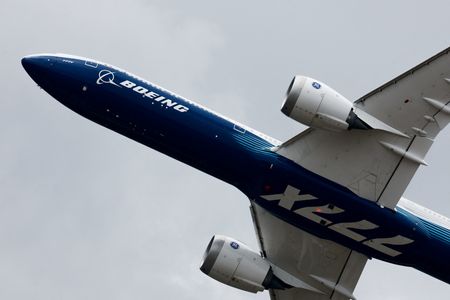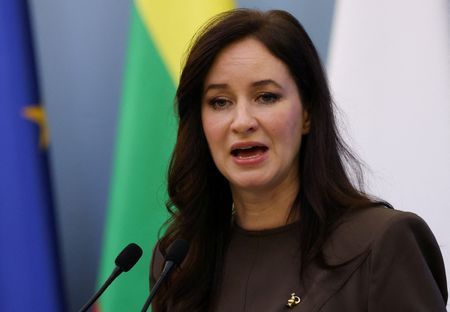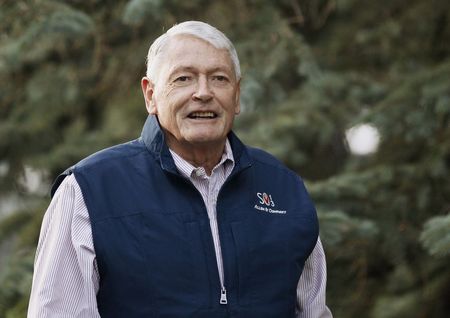By Dan Catchpole, Shivansh Tiwary and Allison Lampert
(Reuters) -Boeing pushed the first delivery of its long-delayed 777X jet program out to 2027 and took a wider-than-expected $5 billion charge due to the delays, in another series of setbacks for the aerospace giant.
The 777X was central to Boeing’s long-term widebody strategy, previously dominated by its iconic 747 and 777 jets. But repeated certification and production delays have pushed back deliveries by years, piling up charges of over $15 billion and straining its finances, while giving an opening to rival Airbus’s competing A350 as international travel continues to surge.
Last month, CEO Kelly Ortberg said the company was behind schedule in certifying the jet, saying a “mountain of work” needed to be done but did not mention further delay to first delivery, which was slated for 2026, at the time.
He said, however, no new technical problems had been identified.
The company has conducted more than 4,000 flight test hours, more than twice a typical program, Ortberg said during a conference call with analysts on Wednesday.
“However, we still have a significant portion of the flight test certification program to go,” he added.
Wall Street analysts had anticipated a sizeable 777X program charge, which includes penalties owed to customers for late deliveries.
Boeing shares fell 2% in early trading.
Richard Aboulafia, managing director of AeroDynamic Advisory, a U.S. boutique aerospace management consulting firm, said the charge was more than the $2 billion to $4 billion he expected. While he does not expect the charge to be financially crippling to debt-laden Boeing, “it does raise questions about any more surprises to come.”
The delays and charges are partly due to challenges within the certification process as Boeing waits for a key milestone before final certification, two sources familiar with the matter told Reuters.
The Federal Aviation Administration was not immediately reachable for comment.
The world’s largest leasing firm, Dublin-based AerCap, warns of shortages of big jets. “The wide-body market is extraordinarily acute,” CEO Aengus Kelly told analysts.
“Now it might be getting to a challenge,” Aboulafia said as demand grows for twin-aisle jets. “People start to lose patience and demand compensation.”
Lufthansa declined to comment on Wednesday’s announcement on delays to the 777x. However, last week Chief Executive Carsten Spohr said he expected further delays to the model. Lufthansa has repeatedly lamented delivery delays from Boeing, arguing that the slowdown has stopped the carrier from renewing its aging fleet and cutting down on fuel costs.
The larger-than-expected charge was offset by the company’s free cash flow of $238 million, turning positive in the quarter for the first time since 2023. Boeing’s deal with the U.S. Department of Justice to avoid prosecution related to two 737 MAX crashes saved the company roughly $700 million in fines it had expected to pay this quarter.
YEARS OF QUALITY ISSUES, DELAYS
After years of grappling with quality issues and production delays on its flagship 737 MAX, Boeing cautiously ramped up monthly output in 2025.
The company has decreased work done out of order, a key indicator of production quality, by 75% on the 737 program and by 60% across all programs, Ortberg said during Wednesday’s conference call.
Earlier this month, the company received the long-awaited approval from the U.S. Federal Aviation Administration to increase 737 MAX production to 42 jets per month, easing a cap of 38 that had been in place since January 2024. That cap was imposed following a mid-air panel blowout in January 2024 on a nearly new aircraft.
Boeing continues to work on certifying the 737-7 and 737-10, the smallest and largest versions of its best-selling 737 MAX.
Boeing delivered 55 jets in September, marking its strongest performance for that month since 2018. This was a significant jump from the 33 deliveries recorded a year earlier, when a strike involving 33,000 factory workers in the Pacific Northwest disrupted production.
Deliveries are closely watched by Wall Street, as planemakers typically receive the bulk of their payments upon handing over the jets to customers, making deliveries a key indicator of revenue and cash flow.
The planemaker posted an adjusted loss of $7.47 per share for the quarter through September, compared with analysts’ average expectations of a $4.59 loss, according to LSEG.
Its revenues for the quarter rose 30% to $23.27 billion, above expectations of $21.97 billion.
Boeing Defense, Space and Security revenue rose 25% year-over-year and 10% ahead of analysts’ expectations, despite a 13-week-long strike by factory workers who assemble fighter jets, other military aircraft and munitions in the St. Louis area.
Since the strike began on Aug. 4, the company has said it will not increase the overall cost of its contract offers, the latest of which was rejected by the roughly 3,200 members of the International Association of Machinists and Aerospace Workers (IAM) District 837 on Sunday.
The strike has stopped deliveries of new F-15EX jets to the U.S. military.
Seventeen members of the U.S. House of Representatives, including one Republican, sent a letter to Boeing on Wednesday, urging the company to resume negotiations with the IAM.
(Reporting by Shivansh Tiwary in Bengaluru and Dan Catchpole in Seattle. Additional reporting by Allison Lampert in Montreal, Joanna Plucinska in London, and Padraic Halpin and David Shepardson in Washington; Editing by Sriraj Kalluvila and Nick Zieminski)











